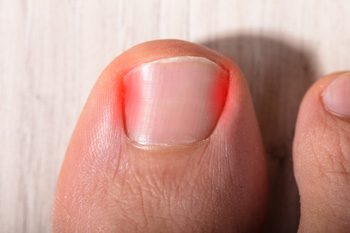
Ingrown toenails can cause immense discomfort and frustration. Understanding the different types and underlying causes can help prevent and address this uncomfortable foot condition. The edge of a toenail that grows into the surrounding skin is referred to as a distal ingrown toenail and is considered to be the most common type. When the nail grows into either side of the skin, this is known as a lateral ingrown toenail. Common symptoms can include redness, swelling, and it may become infected. If the toenail is not trimmed properly, it may result in a portion of the nail penetrating the skin, which is known as a partial ingrown toenail. People who wear shoes that do not fit correctly, in addition to those with a foot injury, may find they have developed an ingrown toenail. If you have this foot condition, it is strongly suggested that you consult with a podiatrist who can offer you treatment options that may include minor surgery for partial removal.
Ingrown toenails can become painful if they are not treated properly. For more information about ingrown toenails, contact one of our podiatrists of Crosstown Podiatry. Our doctors can provide the care you need to keep you pain-free and on your feet.
Ingrown Toenails
Ingrown toenails occur when a toenail grows sideways into the bed of the nail, causing pain, swelling, and possibly infection.
Causes
- Bacterial infections
- Improper nail cutting such as cutting it too short or not straight across
- Trauma to the toe, such as stubbing, which causes the nail to grow back irregularly
- Ill-fitting shoes that bunch the toes too close together
- Genetic predisposition
Prevention
Because ingrown toenails are not something found outside of shoe-wearing cultures, going barefoot as often as possible will decrease the likeliness of developing ingrown toenails. Wearing proper fitting shoes and using proper cutting techniques will also help decrease your risk of developing ingrown toenails.
Treatment
Ingrown toenails are a very treatable foot condition. In minor cases, soaking the affected area in salt or antibacterial soaps will not only help with the ingrown nail itself, but also help prevent any infections from occurring. In more severe cases, surgery is an option. In either case, speaking to your podiatrist about this condition will help you get a better understanding of specific treatment options that are right for you.
If you have any questions please feel free to contact our offices located in Wayne, Montclair, and Randolph, NJ . We offer the newest diagnostic and treatment technologies for all your foot and ankle needs.
